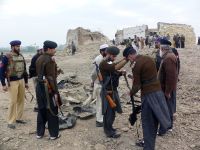Minister of Prisoners Affairs Hisham Abdel Raziq denied that he had any knowledge of a committee recently formed in coordination with Lebanese Hizbollah movement to submit names of Palestinian prisoners so that they could be included in Hizbollah’s swap of prisoners with Israel, in light of recent Hizbollah operations in which three Israeli soldiers and a colonel were taken captives.
Hizbollah leaders, who have announced the Israeli prisoners will be used as bargain chips to release Lebanese and Arab prisoners in Israeli jails, have asked Hamas, Islamic Jihad and Popular Front for the Liberation of Palestine-General Command to work on an authentic list of Palestinian prisoners in anticipation of the exchange.
A PFLP-GC official in the West Bank had told Albawaba.com that the committee had contacted all parties involved to come up with a list that “excludes none.”
Abd Alraziq told Albawaba.com that he received a phone call from Fateh movement in Lebanon, and was asked to submit names of Palestinian prisoners in Israel, but that had no connection with the “committee.”
He said the PNA names of about one thousand and six hundred names of prisoners from different Palestinian factions.
The following is the full text of the phone interview with the minister:
Q: What do you say about the anticipated swap of prisoners between Hizbollah and Israel that will include Palestinian prisoners?
The seizure of Israeli soldiers by Hizbollah will present another opportunity for prisoner-exchange. In light of our knowledge of Israel’s “sensitivity” regarding such operations, experience has proved Israel’s extreme concern regarding the safety and the release of its prisoners. I personally feel that the possibility of the release of the Palestinian and Lebanese prisoners by Israel is there. I also trust that Hizbollah will fight this battle with great confidence, wisdom, and knowledge that we all see in them.
I have to add here that danger lies in the possibility that Israel finds out where the prisoners are kept, this will lead it to use any technology in hand to try and save the prisoners with minimum causalities. Other then that I can say that I am sure that the possibility of the release of all prisoners is as good as done.
I gave officials in Fateh the names of the Palestinian prisoners and detailed data regarding reason for arrest and sentences. As for the formation of a committee made of the three movements of Hamas The Islamic Jihad and The General Command Front I have no real knowledge of the committee I was not invited I was no contacted regarding the subject in addition to that this committee is the business of Hizbollah and the Parties involved, and we are ready to cooperate with it for the sake of the safety of our prisoners
Have the lists been submitted?
We have sent the names of all prisoners from all Palestinian factions. We do not discriminate between Fateh members and those belonging to other Palestinian factions. But regarding priorities, there has been an agreement regarding the number of the prisoners to be released: We shall give priority to the Arab soldiers captured when their patrols clashed with the Israeli forces on borders. Then the prisoners of Palestine of 1948 to be followed prisoners from Jerusalem. The fourth dispatch will include prisoners from the West Bank and the Gaza Strip
We will take into consideration the length of imprisonment, keeping in mind that the number of prisoners is more then thousand and six hundred.
Q: Why do you set priorities in this manner?
The soldiers captured in clashes on border with Israel are of different Arab nationalities. These soldiers took the side of the Palestinians and fought for Palestine. In addition to that, they are the prisoners who have spent the longest times in Israeli jails and this fact alone is enough to place them on top of the list. Israel is refusing to release them and it has never agreed to free them in previous prisoner exchanges.
As for giving the second priority to the 1948 prisoners, this is done for solidarity reasons and also because their sacrifices were greater.
Jerusalem is next on the agenda because of the importance of this city and the need to enhance its role in the struggle against Israel.
The number West Bank and Gaza Strip prisoners are great and many are serving very long sentences.
© 2000 Al Bawaba (www.albawaba.com)







